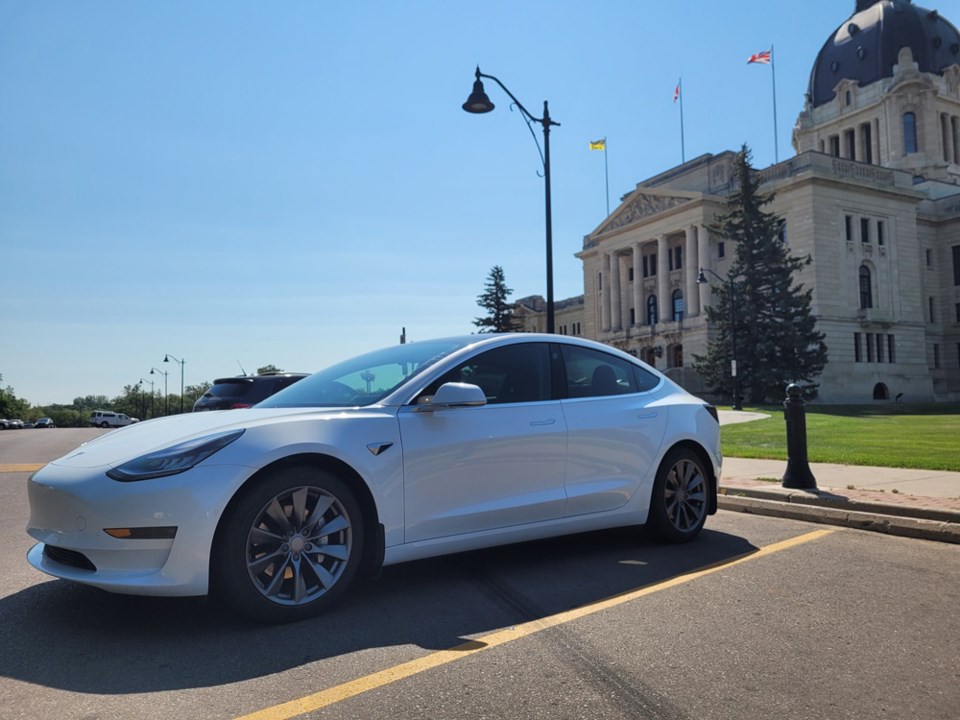SASKATOON — A non-profit group is pushing for the Saskatchewan government to postpone collecting taxes from electric vehicle owners, a move that would further promote the alternative of using environment-friendly automobiles in the province.
The Saskatchewan Environmental Society is using a tongue-in cheek-campaign where the action group Saskatchewanians for Sidewalk Sustenance is demanding an annual fee for sidewalk use in the province be imposed.
“This is just a tongue in cheek campaign to raise awareness of the inadvisability of an EV tax. It is a campaign that drew a parallel between EV’s, which are good for the environment," said environmental economist and spokesperson Joel Bruneau, who added that he works for SES as a free agent.
“There are good choices for your community with walking on the sidewalk, which is good for your health and good for the environment. So, if the government is putting a tax on doing something good for the environment, the joke is, well, why don’t they do that for walking since that’s also good for the environment and good for your health?”
In a satirical release, a Saskatoon-based citizens action group, Saskatchewanians for Sidewalk Sustenance, is launching a province-wide information campaign to have sidewalk users pay an annual fee to help with the maintenance and upkeep of the sidewalks.
Bruneau told SASKTODAY that they are just raising the issue about EV tax.
“You would never tax walking on sidewalks. That’s a silly idea. Well, isn’t taxing an EV also a silly idea? So, that’s the parallel that the campaign wants to draw.”
He added that suspending the tax imposed on EVs is a reasonable idea that SES is pushing for that would increase the number in the province.
“The campaign is asking the provincial government to suspend the EV tax until the provincial feel of EVs increases to 1.3 per cent in comparison to fuel-based cars.”
Bruneau said the current number of automobiles in the province is about 800,000 — cars, SUVs, and light trucks — compared to only 600 EVs and suspending the EV tax will be beneficial.
“That is like a fraction of one percent. The campaign's point is, you’re only going to raise $150 per car, $90,000 [total]. That’s going to do nothing. But it does send a signal that Saskatchewan is not friendly to EVs. So, what we’re asking is just don’t implement it right now.”
“You’ve got it on the books and just suspend it. You can decide that ‘we’re not going to collect it this year. Let the fleet in Saskatchewan grow. It is growing and it will continue to grow. If at a point it reaches 1.3 percent, which is about 10,000 vehicles, then implement the EV tax. You’ll generate more than a million dollars. It will make a difference, but let this very small number of EVs grow into something that’s significant and self sustaining.”
He added that the provincial government has the option to do that. “The government has the power to do this, ‘we’re not going to collect it’ and they are on the books. They [provincial government] can just suspend it until further notice. They could choose to do that. It would send a signal to potential owners and businesses that Saskatchewan is open to have EVs.”
However, infrastructure is also a problem, according to Bruneau.
“Right now, EV’s are a small number and there’s very little infrastructure. As infrastructures gets rolled out, as more people get EVs, then it will build momentum. For fairness, you want to make sure that everybody contributes to the roads and the EV tax is one way. Right now, it doesn’t seem much of a point for, and it will change nothing other than sending the wrong signal,” said Bruneau.
“Nobody’s arguing that [EVs] are going to be the only vehicles in Saskatchewan or it’s the best choice for everybody. Some people have decided that an EV is the best choice for themselves. To make that ever more desirable, we need the infrastructure. But, if the province sends a [wrong] signal that we don’t like EVs, then the infrastructure is going to be much slower in [setting up].”
Bruneau said having no infrastructure to support EVs is a problem the industry faces in the province. “It hampers the development of alternative energy using vehicles. That’s one of the problems that arises. If you look at all major manufacturers of automobiles, everybody is moving towards hybrid and EV platforms. They will reduce the number of non-EV choices, so if we don’t have the infrastructure in 10 years, that places all the people of Saskatchewan at a disadvantage.”
“It’s almost akin to high-speed internet. If your community doesn’t have high speed-internet you’re at a disadvantage. If your community doesn’t have the ability to charge cars that arrive in your community, you’re at a disadvantage. Right now, you can drive to Regina and find charging stations.”
“But could you go to Tisdale and find a charging station? I don’t know and if you can’t find a charging station in Tisdale, if you own an EV, that becomes a question. But if we know that most of the communities have some sort of charging station associated with a petrol station, then yes, you can go and charge your EV for 15 minutes and you will be able to go home. But we’re not there yet.”



